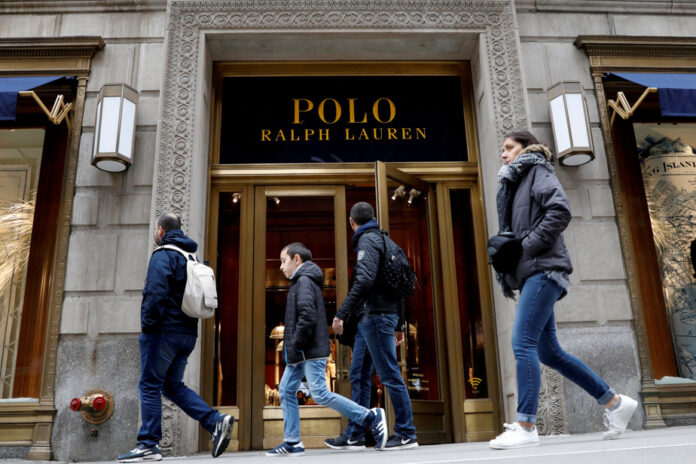(OTTAWA) The Canadian Ombudsman for Responsible Business announced on Tuesday that she is opening a formal investigation into fashion company Ralph Lauren Canada over the alleged use of Uyghur forced labor in its supply chains.
Sheri Meyerhoffer said in a statement that it is unclear whether the company is doing enough to eliminate components linked to the mistreatment of the Uyghur minority in China from its supply chains.
Meyerhoffer also called on Toronto-based mining company GobiMin to improve its policies to prevent the potential use of forced labor in its supply chains.
“Following the release of these reports, the Bureau will launch an investigation into the complaint against Ralph Lauren Canada,” reads a statement from the Canadian Ombudsman for Responsible Business.
The complaint against Ralph Lauren Canada was filed in June 2022. The Ombudsman’s initial assessment report indicates that in response to his questions, Ralph Lauren Canada insisted in November that its head office is located in the United States United States, and therefore could not be the subject of a Canadian investigation.
The company later detailed, last June, the measures put in place to prevent abuse in its supply chain.
“Ralph Lauren Canada’s refusal to participate in the initial assessment phase [of the Ombudsman], followed by a last minute change indicating a willingness to participate and cooperate in the process […] made it difficult to complete evaluation,” reads the report released on Tuesday.
Ms. Meyerhoffer emphasizes that “to be effective, human rights due diligence must take place in an open, participatory and responsive framework to address complaints or grievances raised by stakeholders.”
China denies that any forced labor of Uyghur citizens takes place in what it has called “detention” centers or “re-education” camps in Xinjiang. Beijing assures that these centers are intended to eliminate Islamic radicalization, after several deadly attacks in China.
But the United Nations found in 2022 that China had committed “serious human rights violations” against Uyghurs and other Muslim communities, which “may amount to international crimes, in particular crimes against humanity.” .
The US government has said cotton and tomato products from China are at high risk of involving Uyghur forced labor.
In his report, ombudsman Meyerhoffer cites two suppliers of textile materials for Ralph Lauren. Experts argue that these two suppliers allegedly bought cotton from Xinjiang through intermediaries, or contributed to the transfer of forced laborers.
Ms. Meyerhoffer notes that Ralph Lauren has issued several corporate statements and conducted human rights reports and surveyed its own suppliers. The company is also committed upstream to a process of improving its supplier data.
But according to the federal ombudsman, it’s not clear from these documents how extensive the company’s efforts are in using fiber origin-tracing technology to ensure that Ralph Lauren does not use products made from forced labor.
Meyerhoffer encouraged the company to mediate with the plaintiffs, a coalition of human rights groups that includes many Uyghur organizations. She said the process could take place behind closed doors, with the ombudsman reviewing the final outcome.
Had Ralph Lauren cooperated with the investigation early in the process, the plaintiffs would have agreed to confidential mediation — without publicly naming the company, the ombudsman noted.
In a separate report, Ms. Meyerhoffer also called on Toronto-based mining company GobiMin to improve its corporate reporting, following allegations that it hired local companies that used forced labor at a gold mine in Xinjiang, before selling the mine to a Chinese company last year.
“GobiMin also failed to provide evidence that it responsibly exited this high-risk area when it sold its stake in Xinjiang Tongyuan Minerals Limited,” the ombudsman says in this second report. .
The Office of the Canadian Ombudsman for Responsible Business was opened in 2018 and its four “initial assessments” announced so far relate to China’s Xinjiang region, where most of the country’s Uyghur population lives. Ms. Meyehoffer reported similar allegations last month regarding Nike Canada and Dynasty Gold.
The Chinese Embassy in Ottawa assures that Beijing does not allow modern slavery.
“The ‘forced labor’ allegation in Xinjiang is a huge lie fabricated by anti-China forces to denigrate China for the sole purpose of destabilizing Xinjiang and containing China’s development, under the guise of so-called ‘issues of human rights,” a spokesperson wrote last month in response to Meyerhoffer’s two earlier reports.
“This runs totally counter to the reality in Xinjiang, where cotton and other industries rely on large-scale mechanized production, and the rights of workers of all ethnic groups […] are duly protected. »
Critics of the federal agency argue that it lacks the tools it needs to be effective, such as the ability to compel the filing of documents and subpoena witnesses.
If the ombudsman discovers that a company is not acting in good faith, he can have it excluded from all Canadian support. But his mandate does not allow him to impose fines or other punitive measures on companies.
The Canadian Press unsuccessfully sought comment from Ralph Lauren Canada and GobiMin.















